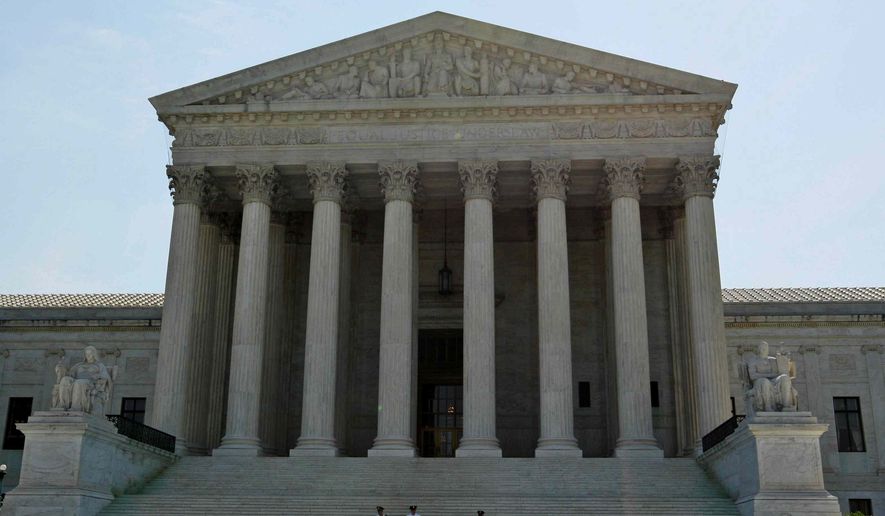The absence of Justice Antonin Scalia’s acerbic wit and questioning was felt acutely as the Supreme Court heard oral arguments Wednesday regarding a set of Texas abortion clinic regulations. But conservatives may miss the late jurist’s vote even more.
Scalia’s death leaves opponents of abortion in a tight position in Whole Woman’s Health v. Hellerstedt, which is being billed as the most significant Supreme Court case on the subject since 2007 but could wind up in a 4-4 deadlock.
If Justice Anthony Kennedy, who holds the swing vote, sides with the three conservatives on the bench, the Supreme Court would split 4-4 and leave intact the ruling of the 5th U.S. Circuit Court of Appeals, which upheld the Texas law requiring doctors to have admission privileges at a nearby hospital and imposing tighter health and safety standards on abortion clinics.
Should Justice Kennedy give liberals a 5-3 majority, the case would become binding precedent nationwide, potentially striking down similar regulations in other states and granting a significant coup to proponents of abortion rights.
Pro-life attorney Clark Forsythe, who was in the courtroom during Wednesday’s oral argument, said he thinks Justice Kennedy will side with conservatives based on the justice’s line of questioning.
“It seemed based on the questioning ‚ and, you know, you always hazard a guess based on questioning — it seemed most likely that the Court would divided 4-4,” said Mr. Forsythe, who serves as acting president and senior counsel to Americans United for Life.
SEE ALSO: Obama considers Jane Kelly, Iowa judge, for Supreme Court
Mr. Forsythe said Justice Kennedy joined conservatives on the bench who peppered the petitioner’s attorney with skeptical questions during oral argument.
“Chief Justice [John] Roberts, Justice [Samuel] Alito and Justice Kennedy asked most of the questions of the attorney for the Center for Reproductive Rights,” he said, adding that Justice Kennedy “did not ask many skeptical questions of any of the attorneys of Texas.”
Petitioners argued the law imposes an “undue burden” on women seeking abortions in the Lone Star State.
Under the Texas law, doctors at abortion clinics are required to have ties to a hospital within 30 miles, which pro-choice proponents say has closed down several rural clinics. Clinics also must meet care and safety standards for outpatient surgery similar to what hospitals have.
For her part, Justice Ruth Bader Ginsburg fired skeptical questions about the need for the Texas law, asking state Solicitor General Scott Keller “what is the legitimate interest in protecting their health? What evidence is there that … the prior law was not sufficiently protective of the women’s health?”
Mr. Keller said more than 200 women are hospitalized annually as a result of complications from abortions, a rate he acknowledged is small but said the state can still act to make abortion safer.
SEE ALSO: GOP to U.N.: Don’t use Zika outbreak to loosen abortion laws
Petitioners contend only abortion providers located in four metropolitan areas — Austin, Dallas-Fort Worth, Houston and San Antonio, all clustered in the eastern half of the huge state — could meet such these regulations.
Planned Parenthood Action Fund said in a statement on Wednesday that the case “could redefine abortion access in America.”
“If the Court rules later this year to uphold Texas’ draconian anti-abortion law, it would devastate access to abortion in Texas and pave the way for even more states to enact similar laws — leaving abortion legal in name only for many women,” Planned Parenthood said.
The “undue burden” standard comes from the landmark 1992 case Planned Parenthood v. Casey, in which Justice Kennedy sided with the majority reaffirming the right to an abortion found in the 1973 case Roe v. Wade.
The burden is defined as one in which a “substantial obstacle in the path of a woman seeking an abortion before the fetus attains viability.”
Mr. Forsythe said the Texas law does not constitute such an obstacle pointing to three abortion clinics in Texas that have opened since the legislation passed in 2013.
The most recent major case concerning abortion was the 2007 decision in Gonzales v. Carhart, in which Justice Kennedy writing for the 5-4 majority upheld a federal law banning partial-birth abortions.
• Bradford Richardson can be reached at brichardson@washingtontimes.com.




Please read our comment policy before commenting.